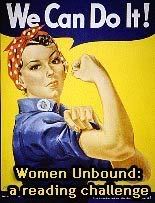
 Douglas' theory of enlightened sexism holds that it "is a response, deliberate or not, to the perceived threat of a new gender regime. It insists that women have made plenty of progress because of feminism - indeed, full equality has allegedly been achieved - so now it's okay, even amusing to resurrect sexist stereotypes of girls and women" (9). It "is more nuanced and much more insidious than out-and-out backlash. As Susan Faludi
Douglas' theory of enlightened sexism holds that it "is a response, deliberate or not, to the perceived threat of a new gender regime. It insists that women have made plenty of progress because of feminism - indeed, full equality has allegedly been achieved - so now it's okay, even amusing to resurrect sexist stereotypes of girls and women" (9). It "is more nuanced and much more insidious than out-and-out backlash. As Susan Faludi Douglas then goes on to painstakingly dissect what has happened in popular culture since Backlash was first published in 1991, focusing primarily on magazines and television programming, with a little bit of music critique thrown in (she wasn't happy when her daughter was a Spice Girls fan in the 90s, uncomfortable with the group's attempt to pass off their sexuality as a girl power/feminist message). Xena and Buffy are upheld as feminist TV standards. The original 90210 and Melrose Place, which aired at roughly the same time, were an anti-feminist wasteland when it came to portrayals of women, but feminism had clearly influenced the men as they were softer and more affectionate than previous generations of TV men. Shows like Murphy Brown were a grey area, showing a powerful woman successful in her career, but also bringing with it a lot of embedded feminism, as Murphy's achievements were presented simply as "part of the cultural landscape" and it was never mentioned how much she would have had to struggle to achieve such a position in the real world (9). Then Ally McBeal and reality TV came along and this was the beginning of the end.
Magazines for women and men are also skewered, women's magazines for their contradictory advice ("love your body!" on one page and "New miracle diet!" on the next) and male-gaze-centric advice (ever notice how all of those lurid headlines for better sex are about improving his pleasure?), men's magazines (primarily Maxim) for their soft-core porn views of women. She also focuses a lot on the celebrity tabloid culture that has arisen, including how even CNN was focused for days on the non-story of Anna Nicole Smith's death.
I have to admit, I found all of this interesting, but I also had a healthy feeling of "this is nothing new." I don't want to put another nail in publishing's coffin, but I wonder if books like Douglas' are going to be on their way out soon, because almost every topic has already been covered by blogs - and they've even taken some of her reporting farther. In the last chapter Douglas looks at motherhood and how stories of women "opting out" of the workforce have been greatly exaggerated, and the new books and blogs that rising showing women truly struggling with motherhood, not even trying to keep up the veneer of "having it all," and being celebrated for it. Well, that last bit sounds an awful lot like the bad mommy genre that was the talk of the blogs in May 2009 (Enlightened Sexism was published in March 2010). While the book gives a name to a lot of subjects I've thought about before (I particularly liked embedded feminism), for anyone who's been following the conversations on the major feminist blogs, all of this is old news. It's nice having everything in one location, but in the age of blogs, are books like this redundant?
But redundant or not, the most damning part of Douglas' book is...her tone. Okay, I totally cringe to use that word in a discussion of a feminist work, but I'm not sure what else fits here. Basically, Douglas sets up a lot of her arguments as an "us vs. them" battle - and I'm not talking men vs. women. No, for Douglas the "us" is older women (or "vintage females" as she bizarrely refers to herself throughout the text) and the "them" is every one younger who is implicitly held responsible for the popularity of tacky magazines and preposterous reality TV shows. In her conclusion, Douglas presents two possible scenarios of the future, one where a feminist grandmother is surrounded by ridiculous things like potty-training thongs for her granddaughter, who she's caring for while her daughter tries to figure out how to handle going back to work after 6 weeks unpaid maternity leave, and another future in which the feminist grandmother is part of a movement where all older women have risen up and renewed the consciousness-raising strategies of the 70s to revolutionize American culture. In both cases, women of my generation (mid-twenties), are left out of the solution.
I felt similarly about Flow when I reviewed it two weeks ago - how are these books getting nominated for the Amelia Bloomer list? Both are definitely feminist books, so they fit the list's first criteria, but I can't imagine any young woman willingly reading either of these and feeling like she was represented. Both books focus on the experiences and attitudes of women who are at least a decade past their teen years, and the Amelia Bloomer list's charge is to find feminist titles for young readers ranging from birth to 18. There's nothing here keeping a high schooler from reading Enlightened Sexism, and I think the average high schooler could learn a lot, but first she would have to get past Douglas' apparent bias against young women, and that just might be too tall of an order.
